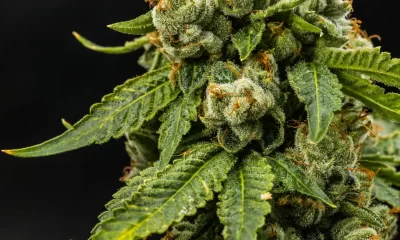Government
New Jersey Lays Out Guidance For Cannabis Rules in the Workplace

New Jersey regulators say employers can still conduct drug tests.
Regulators in New Jersey last week issued fresh employment guidance for cannabis use among workers, as the state navigates through a new era of marijuana legalization.
The guidance from the New Jersey Cannabis Regulatory Commission, handed down on Wednesday, was meant as “a first step towards formulating and approving standards for Workplace Impairment Recognition Expert certifications,” the agency said in the announcement.
The commission said that the guidance, coupled with the Reasonable Suspicion Observation Report Form, “is meant to support employers’ right to create and maintain safe work environments, and to affirm employees’ right to due process.”
“The purpose of this guidance is to clarify and explain the NJ-CRC’s understanding of the existing legal requirements under the governing law,” the commission said in the guidance. “This guidance does not impose any additional requirements that are not included in the law and does not establish additional rights for any person or entity. Please note, however, that adverse employment actions may impact employees’ protected rights under various laws including, but not limited to, state and federal anti-discrimination laws. When incorporating this guidance, employers should ensure compliance with all state and federal employment laws.”
Most notably, the guidance affirms certain rights of employers under the new adult-use cannabis law in New Jersey, while also maintaining an employers’ rights to enforce certain workplace policies.
The Cannabis Regulatory Commission said that “employees cannot be acted against solely due to the presence of cannabis in their body, that but [sic] employers have the right to drug test on reasonable suspicion of impairment.”
“Striking a balance between workplace safety and work performance and adult employees’ right to privacy and to consume cannabis during their off hours is possible,” Jeff Brown, the executive director of the New Jersey Cannabis Regulatory Commission, said in a statement on Wednesday. “We have been doing that with alcohol without thought.”
The outlet NJBIZ reports that “an employer cannot use the test alone to take disciplinary action against the employee [and] the employer must combine the results with ‘evidence-based documentation’ of impairment during the employee’s work hours,” and that the “new guidance is intended to be used until the CRC implements WIRE certification standards, which will be used to detect impairment from cannabis or other substances for employees or contractors.”
WIRE, which stands for “Workplace Impairment Recognition Expert standards, are “to be issued to full- or part-time employees, or others contracted to perform services on behalf of an employer, based on education and training in detecting and identifying an employee’s usage of, or impairment from, a cannabis item or other intoxicating substance, and for assisting in the investigation of workplace accidents,” the commission said.
“A scientifically reliable objective testing method that indicates the presence of cannabinoid metabolites in the employee’s bodily fluid alone is insufficient to support an adverse employment action,” the commission said in its guidance. “However, such a test combined with evidence-based documentation of physical signs or other evidence of impairment during an employee’s prescribed work hours may be sufficient to support an adverse employment action.”
Legal adult-use cannabis sales in New Jersey officially launched in April following the passage of a ballot measure in 2020 to legalize recreational pot in the state.
In August, the Cannabis Regulatory Commission said that the state generated almost $80 million in the first ten weeks of legal marijuana sales.
“The market is improving. It is performing as we expect with the current number of dispensaries, the spread of locations, and the high prices,” Brown said in a statement at the time. “As more cannabis businesses come online, consumers won’t have to travel as far to make purchases, and prices will fall with increased competition. The market will do even better.”
Source: https://hightimes.com/news/new-jersey-lays-out-guidance-for-cannabis-rules-in-the-workplace/
Business
New Mexico cannabis operator fined, loses license for alleged BioTrack fraud

New Mexico regulators fined a cannabis operator nearly $300,000 and revoked its license after the company allegedly created fake reports in the state’s traceability software.
The New Mexico Cannabis Control Division (CCD) accused marijuana manufacturer and retailer Golden Roots of 11 violations, according to Albuquerque Business First.
Golden Roots operates the The Cannabis Revolution Dispensary.
The majority of the violations are related to the Albuquerque company’s improper use of BioTrack, which has been New Mexico’s track-and-trace vendor since 2015.
The CCD alleges Golden Roots reported marijuana production only two months after it had received its vertically integrated license, according to Albuquerque Business First.
Because cannabis takes longer than two months to be cultivated, the CCD was suspicious of the report.
After inspecting the company’s premises, the CCD alleged Golden Roots reported cultivation, transportation and sales in BioTrack but wasn’t able to provide officers who inspected the site evidence that the operator was cultivating cannabis.
In April, the CCD revoked Golden Roots’ license and issued a $10,000 fine, according to the news outlet.
The company requested a hearing, which the regulator scheduled for Sept. 1.
At the hearing, the CCD testified that the company’s dried-cannabis weights in BioTrack were suspicious because they didn’t seem to accurately reflect how much weight marijuana loses as it dries.
Company employees also poorly accounted for why they were making adjustments in the system of up to 24 pounds of cannabis, making comments such as “bad” or “mistake” in the software, Albuquerque Business First reported.
Golden Roots was fined $298,972.05 – the amount regulators allege the company made selling products that weren’t properly accounted for in BioTrack.
The CCD has been cracking down on cannabis operators accused of selling products procured from out-of-state or not grown legally:
- Regulators alleged in August that Albuquerque dispensary Sawmill Sweet Leaf sold out-of-state products and didn’t have a license for extraction.
- Paradise Exotics Distro lost its license in July after regulators alleged the company sold products made in California.
Golden Roots was the first alleged rulebreaker in New Mexico to be asked to pay a large fine.
Source: https://mjbizdaily.com/new-mexico-cannabis-operator-fined-loses-license-for-alleged-biotrack-fraud/
Business
Marijuana companies suing US attorney general in federal prohibition challenge

Four marijuana companies, including a multistate operator, have filed a lawsuit against U.S. Attorney General Merrick Garland in which they allege the federal MJ prohibition under the Controlled Substances Act is no longer constitutional.
According to the complaint, filed Thursday in U.S. District Court in Massachusetts, retailer Canna Provisions, Treevit delivery service CEO Gyasi Sellers, cultivator Wiseacre Farm and MSO Verano Holdings Corp. are all harmed by “the federal government’s unconstitutional ban on cultivating, manufacturing, distributing, or possessing intrastate marijuana.”
Verano is headquartered in Chicago but has operations in Massachusetts; the other three operators are based in Massachusetts.
The lawsuit seeks a ruling that the “Controlled Substances Act is unconstitutional as applied to the intrastate cultivation, manufacture, possession, and distribution of marijuana pursuant to state law.”
The companies want the case to go before the U.S. Supreme Court.
They hired prominent law firm Boies Schiller Flexner to represent them.
The New York-based firm’s principal is David Boies, whose former clients include Microsoft, former presidential candidate Al Gore and Elizabeth Holmes’ disgraced startup Theranos.
Similar challenges to the federal Controlled Substances Act (CSA) have failed.
One such challenge led to a landmark Supreme Court decision in 2005.
In Gonzalez vs. Raich, the highest court in the United States ruled in a 6-3 decision that the commerce clause of the U.S. Constitution gave Congress the power to outlaw marijuana federally, even though state laws allow the cultivation and sale of cannabis.
In the 18 years since that ruling, 23 states and the District of Columbia have legalized adult-use marijuana and the federal government has allowed a multibillion-dollar cannabis industry to thrive.
Since both Congress and the U.S. Department of Justice, currently headed by Garland, have declined to intervene in state-licensed marijuana markets, the key facts that led to the Supreme Court’s 2005 ruling “no longer apply,” Boies said in a statement Thursday.
“The Supreme Court has since made clear that the federal government lacks the authority to regulate purely intrastate commerce,” Boies said.
“Moreover, the facts on which those precedents are based are no longer true.”
Verano President Darren Weiss said in a statement the company is “prepared to bring this case all the way to the Supreme Court in order to align federal law with how Congress has acted for years.”
While the Biden administration’s push to reschedule marijuana would help solve marijuana operators’ federal tax woes, neither rescheduling nor modest Congressional reforms such as the SAFER Banking Act “solve the fundamental issue,” Weiss added.
“The application of the CSA to lawful state-run cannabis business is an unconstitutional overreach on state sovereignty that has led to decades of harm, failed businesses, lost jobs, and unsafe working conditions.”
Business
Alabama to make another attempt Dec. 1 to award medical cannabis licenses

Alabama regulators are targeting Dec. 1 to award the first batch of medical cannabis business licenses after the agency’s first two attempts were scrapped because of scoring errors and litigation.
The first licenses will be awarded to individual cultivators, delivery providers, processors, dispensaries and state testing labs, according to the Alabama Medical Cannabis Commission (AMCC).
Then, on Dec. 12, the AMCC will award licenses for vertically integrated operations, a designation set primarily for multistate operators.
Licenses are expected to be handed out 28 days after they have been awarded, so MMJ production could begin in early January, according to the Alabama Daily News.
That means MMJ products could be available for patients around early March, an AMCC spokesperson told the media outlet.
Regulators initially awarded 21 business licenses in June, only to void them after applicants alleged inconsistencies with how the applications were scored.
Then, in August, the state awarded 24 different licenses – 19 went to June recipients – only to reverse themselves again and scratch those licenses after spurned applicants filed lawsuits.
A state judge dismissed a lawsuit filed by Chicago-based MSO Verano Holdings Corp., but another lawsuit is pending.
Source: https://mjbizdaily.com/alabama-plans-to-award-medical-cannabis-licenses-dec-1/
-

 Business2 years ago
Business2 years agoPot Odor Does Not Justify Probable Cause for Vehicle Searches, Minnesota Court Affirms
-

 Business2 years ago
Business2 years agoNew Mexico cannabis operator fined, loses license for alleged BioTrack fraud
-

 Business2 years ago
Business2 years agoAlabama to make another attempt Dec. 1 to award medical cannabis licenses
-

 Business2 years ago
Business2 years agoWashington State Pays Out $9.4 Million in Refunds Relating to Drug Convictions
-

 Business2 years ago
Business2 years agoMarijuana companies suing US attorney general in federal prohibition challenge
-

 Business2 years ago
Business2 years agoLegal Marijuana Handed A Nothing Burger From NY State
-

 Business2 years ago
Business2 years agoCan Cannabis Help Seasonal Depression
-

 Blogs2 years ago
Blogs2 years agoCannabis Art Is Flourishing On Etsy













